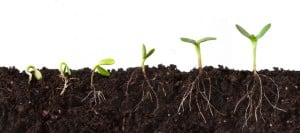As a novice gardener on a spiritual quest to grow the reddest tomatoes, the spiciest peppers, and the sweetest melons, I sought out learning in all different places: books, videos, and especially from other more seasoned farmers. Gardeners and farmers
are some of the most generous folks you will encounter, always willing to offer their creative input and often giving away their treasured secrets to crop brilliance.
Through all the feedback, I found a common thread tying all this valuable insight together. The most successful growers are all fanatical about their soil. Ensuring the right balance of nutrients, proportioned by their unique formulas, was the focus of their attention. It all came down to the stuff I got yelled at for tracking in the house.
At first I found every imaginable ingredient available through the internet including glacial rock dust and exotic alfalfa. My tendency to go a bit overboard when I like something certainly showed up in my new exotic garden. I wasn’t certain if it had the effect I wanted but I felt accomplished for my bold steps. I tend to repeat this impulse when cooking which is why my kids have learned to watch me carefully so I’m not throwing in too many exotic ingredients.
If you are intrinsically scientific by nature, you will appreciate the idea that the three most notable elements of soil fertility are magnesium, potassium, and nitrogen. If you are a more creative type, consider the phrase, brown plus green makes black gold. Mixing what may seem like waste product together (grass clippings & fallen leaves) can be the base for a nutrient rich soil.
Soil, the fertile ground from which life springs forth, can easily produce large plants with very little fruit, small plants with an abundance of weak, disease-prone
fruit, or a hundred and one other permutations of variable yields we scratch our heads in confusion about. How can the people who are scientific with their methods and the people who are freestyling, still come up with the same results?
We might look at human growth through a similar lens. Instead of soil composition, sunlight, and water, human growth is fertilized by less tangible elements such as volition, value, and meaning. For maximum growth, we must first identify needs we have and then be able to recognize the degree to which these things exist in us, which in some part is based on life experiences. For example, if we grew up without supportive control, our need for control as an adult may seem greater.
Once we are aware of our needs, we weigh out what attempting to meet these needs may cost us in risk.Negotiation, which consists of risk-taking, receptivity, insight, and compromise, is a building block for our fertile soil- the basis of how we work to get our needs met. We create alliances in our lives that help us to attain our basic needs, with people we feel safe enough to negotiate with. We tend to move away from people whom we have difficulty feeling safe enough to negotiate with, believing they may be too challenging to justify the risk/ reward.
As we tend toward a survivalist mentality, concerned more with our basic needs and less on giving back to sustain a healthy ecosystem, we and our environment become depleted. Instead of crop rotation and experimenting with new plants, we rely on the same formula that proved successful in the past. We can’t figure out why it’s not producing in the same way and we surely aren’t learning what jackfruit and rhubarb is all about.
As a global ecosystem, we have done a poor job or maintaining the balance between what we take from the earth and what we give back. Our oceans are likely ruined beyond repair while people somehow still debate the efficacy of global warming. Our soil is being depleted at an alarming rate with the catalyst of pesticides and animal waste beyond anybody’s wildest imaginations. Perhaps, before we can become more intentional about creating a balanced global ecosystem, we need to learn to cultivate our personal gardens, balancing comfort with challenge, seeking personal fulfillment and strengthening our connections with others.
As we find peace and fulfillment on each of the three planes, self in relation to self, self in relation to others, and self in relation to the world, we find greater meaning and purpose in our lives and our gardens can flourish.

